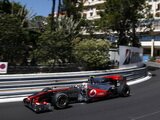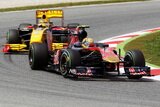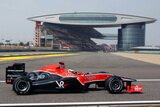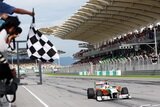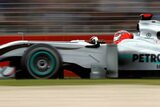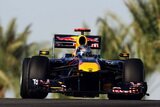 Team principals: Ross Brawn (Mercedes), Stefano Domenicali (Ferrari), Christian Horner (Red Bull) and Martin Whitmarsh (McLaren)
Team principals: Ross Brawn (Mercedes), Stefano Domenicali (Ferrari), Christian Horner (Red Bull) and Martin Whitmarsh (McLaren)Q: A question for you all. Was the result in Bahrain pretty much what you expected or were there some surprises?
Martin Whitmarsh: We didn't think we were going to be that slow. That was a surprise.
Q: But you still finished in the top three.
MW: Yes, we still finished. I think you would have expected the four teams represented here certainly to be at the top and they appear to be. Ferrari and Red Bull look very quick. Other than that I don't think there were any great surprises.
Q: But in the correct order?
MW: Well, not from my viewpoint, but it was good for Ferrari. They have obviously done a good job and Red Bull were very quick in qualifying, startlingly quick. I think we underperformed fairly severely in qualifying. We were a little bit more respectable in the race.
Q: Stefano, any surprises?
Stefano Domenicali: For us it was a fantastic result. To say we were expecting the result at the beginning, I would lie to you. It was a fantastic surprise but nevertheless we don't have to forget that Red Bull seems to be quicker. I think that we are all very close, so as I said in Bahrain we took out the maximum result and considering the level of performance of our main competitors Red Bull, Mercedes and McLaren on top of the others, I think we should be very happy about the fact we were first and second.
Q: Christian?
Christian Horner: The biggest surprise for us I guess was on lap 33 when we were suddenly running on seven cylinders. But up until that point the weekend had gone very well. The problem with winter testing is that with the way fuel loads are now, it is very difficult to predict pace. We stuck to our own programme and it was only really I guess on the Saturday when the fuel came out of the cars that is arguably the first time you get an idea where you stand which was obviously encouraging. The performance of our car in the race was also encouraging. It was just unfortunate that we didn't come away with a Grand Prix victory which was well within our grasp but these things happen.
Q: Ross, were you pretty much where you expected?
Ross Brawn: I think so. There were no major surprises. We are not quite where we want to be and therefore the results were a little bit disappointing. But we know what we have got to do. The season goes through many phases. The first part of the season is everyone establishing where they are and then reacting to where they find themselves, so we are reacting at the moment.
Q: Another question to you all. Coming here to a very different type of circuit, how does your performance here compare to Bahrain? For example, Martin, I think you learned quite a lot from Bahrain which will be of use here.
MW: Well, I hope so but I think we have got to be cautious. I think we have had a reasonable day today. But it is only Friday and as Christian said we are all looking to do a little bit of long running on heavy fuel and vary the fuel loads. That makes it pretty impossible to know exactly where you are. You have just got to follow your own programme but I think we had a reasonable day, but unfortunately it doesn't count for anything, so we will see how we get on tomorrow.
Q: I think you suffered a little bit on the bumps in Bahrain?
MW: We did. I think we didn't have the right downforce for that circuit and we also really didn't react sufficiently to the bumps in the new section of that circuit. We could have done a better job. I don't think necessarily been as quick as Red Bull in qualifying but I think we could have been a little bit closer.
Q: Stefano?
SD: Here today with the weather condition I think for all the teams they have not done a complete programme as expected. We want to keep the same line as we predicted this morning but the fact that the track was not wet enough or not dry enough that was the reason why we didn't go out in that fraction. What Martin and Christian said is totally correct. We don't know exactly where we are. You see the gaps are so big that we know that it is not only the performance on the same level of fuel, so we will know tomorrow exactly where we will be in comparison to all the other competitors. The only thing I can say is that at least what I saw this morning it seems that Renault have done a good job with two cars there in the first 10 places. I think we need to respect the job that they did. The season will bring us new competitors the more we go ahead.
Q: Christian?
CH: We worked through a programme. Both drivers seemed pretty happy with the car. Again difficult to gauge fully where you stand in competitiveness, but it was a shame that a little bit of wet weather interfered with that session. But generally pretty happy and we will see how we go tomorrow.
Q: Ross?
RB: It is very difficult to judge where you are as there are four seconds difference between empty fuel and full tanks. I think everyone runs at both levels to judge where they are on the first day. You have got to check out the brakes, you have got to do some high fuel work. I think with Michael (Schumacher) we made some progress today. I think possibly with Nico (Rosberg) we went the wrong direction on some set-up changes and he wasn't so happy with the car at the end. I think generally we are extracting the potential of the car which we know is not quite high enough yet but we had a reasonable day.
Q: Martin, there was a story about the emphasis being very much on qualifying. Is that more than ever?
MW: I think in the last few years in Formula One you have to qualify near the front. It is very difficult to overtake and maybe typically there are less stops. We are obviously on the same fuel load throughout the race, so we will probably have a bit more emphasis. You have got to qualify well. I think all the teams here and all the teams out there want to be as close to the front of the race as you can be.
Q: Stefano, can Fernando Alonso restore the magic when Michael Schumacher was at Ferrari?
SD: I think it is too early to say that. What we lived with Michael and with Ross, it was a fantastic period but before saying something it is best to do the result and then maybe after that celebrate. So feet on the ground as it is too early. Fernando is a fantastic driver and he has all the potential to do a fantastic job but we need to go ahead step by step.
Q: Christian, there has been a certain amount of confusion about the reason for the problem with the lack of pace perhaps from lap 33 onwards in Bahrain. Can you just explain what happened.
CH: Basically Sebastian immediately radioed in that he had had a big loss of power. The first time he came past it was obvious that there was something wrong. I think that anybody who was anywhere near the circuit could hear that the engine was not running smoothly. Our first diagnostic was that the exhaust had failed as to all intents and purposes that's what it sounded like. He was playing around with some of the mixtures available to him in the cockpit and trying to adapt his driving style and at that stage we thought that not only had a race victory been lost but that he was unlikely to score any points. But he adapted brilliantly well and managed to limit the damage and come home in fourth place which was a big effort and very impressive drive from him given the circumstances. On further investigation the problem was a spark plug that had failed. It is one of those things. Not seen one like it before, certainly not in a Red Bull car and Renault have been unable to fully explain the reasoning behind it. It looks like just one of those rogues which unfortunately struck at just the wrong time.
Q: Ross, looking back a year ago here your own team was making a debut. What an extraordinary year. Just reflect on the last year and the change.
RB: Yes, it is surprising how quickly you forget where you were a year ago when you are dealing with the challenges of a new season. It was an exceptional year for us. Certainly one of the highlights of my career. I think we have entered into a new phase now with the team where we can be more confident in our future planning and in our ideas and investment for the future. Really, quite honestly an astonishing 12 months but what we did last year very quickly disappears into insignificance in terms of what we are trying to achieve this year and what we are trying to achieve for the future, so it was very quickly forgotten. We are more focussed on performing this season.
Q: And the fire still burns just as brightly.
RB: Oh yes, yes. For me personally a year off reminded me how much I enjoy the business. I can still get out of bed in the morning and want to get into the office. The plans we have for the future of the team have been quite invigorating from my perspective.
QUESTIONS FROM THE FLOOR
Q: (Ralf Bach - R & B) Christian, I was very surprised last week by learning from Ron Dennis about your real problems in the race in Bahrain with Sebastian. He said your tank is simply too small.
CH: I guess the problem with age is that your hearing tends to fail you a little bit and perhaps Ron didn't hear the misfire that was there and probably didn't see the fact that the other car also finished the race without any issues at all. It wasn't anything to do with the size of the fuel tank. As I say it was a spark plug issue and that was it.
Q:(Chris Lines - Associated Press) On that fuel issue. We have seen today that Virgin has received permission from the FIA to increase the size of its fuel tanks, so that it can finish races. A question to all guys, how close are you running to the limit of fuel efficiency and on a race like this with high fuel consumption do you expect to see any teams struggling or having to drop their pace?
SD: We are in Formula One and we know that everything is related to performance. The more fuel you put in the car, you have to consider that you run a little bit slower pace. I think it is always a balance that you have to consider as you don't know exactly how the race will be. You may have a safety car period which can be very long, so you need to make sure that you burn the fuel when you can. You have a certain period when it is the opposite and that you need to make sure that you are in the fastest pace that you can. It is really a matter of finding the right balance in order not to have any problem as you are referring and also no problem with the reliability. It is just another challenge this year with these new regulations which you have to consider very carefully.
CH: I think Stefano summed it up perfectly. You push the boundaries in all areas. Fuel efficiency is important. Power is equally important but obviously the amount of fuel you start the race with has an impact on lap time, so it is down to the engine manufacturers. Their consumption is something that they have been quite focussed on over the winter.
RB: I think it's all really been said. There's a formula which varies from track to track of power/fuel starting weight and you run the engine in the best form, both strategically and from a lap time perspective. So you may chose to start with a bit less fuel and run the engine lean for a while which gives less power or you may start with a plan to run the engine at the optimum. I think it depends where you've qualified and how you intend to run the race. I think all of the top teams, certainly, have had enough knowledge from previous years to be able to judge the size of fuel tank (required) and none of us have made them any bigger than they need to be. Bahrain is a hard race in that respect; this is another hard race in that respect, so I think we're all on the limit at these races which is how it should be. The systems are generally sophisticated enough that we shouldn't run out of fuel – it doesn't mean to say we won't, a mistake might be made but we've got pretty good monitoring of the fuel usage of the car to manage it during the race. You may see or hear on the radio that management is going on, when you're in traffic, when you're held up by another car, you may chose to save some fuel, so that you can run the engine at a more powerful setting when you get a clear track. So it's just part of the challenge of Formula One now.
MW: I don't have much to add to that. I think the message is, though, that even if your fuel tank is ample, big enough which I'm sure it is on most of the cars, you will still run it to the limit, because that's what you have to do in Formula One. We can't carry five or ten kilos of fuel around for the entire race. We're just giving ourselves a weight penalty, so we will, as the others have said, take some risk to a degree, you will make some assumptions about how a race is going to pan out and you will fuel accordingly and during the race you will adjust what you're doing to burn the fuel appropriately. So if you've got those calculations wrong, then it's quite difficult. We will need a bit more data tomorrow to make a judgement for the engineers before they go into Sunday because today we had limited running in good conditions.
Q: (Andrea Cremonesi - La Gazzetta dello Sport) Question for Martin as president of FOTA: I know that you have discussed with the other teams about the lack of show in the first Grand Prix. What has been the result of these discussions, is there something that you can do in the short term?
MW: I think most of us would say that we were disappointed by the spectacle that was created in the race in Bahrain, but I think we've got to be careful that we don't jump into decisions on the basis of one race. You look at any season, you will have races which can be entertaining, you will have other races that are considerable less entertaining. I think there has been a very open discussion amongst the teams, we're aware that we've got to watch this very closely. We've agreed to meet again in Malaysia, after we've had two races and I'm sure we'll talk openly about what the options are, whether we need to do anything and if so what we need to do.
Q: (Mike Doodson) Christian, we've spoken about the comparatively monotonous race that we had in Bahrain but I'm interested to know about the strategy both of your team and of Ferrari. If Sebastian hadn't had the problem, those two Ferraris behind looked pretty racy to me. Do you think they might have caught up and we might actually all be talking about what a splendid race it had been with a big scrap at the end of it? Maybe Stefano would give us some details about his strategy too.
CH: Yeah, I can't talk for Ferrari's strategy. I was hoping the last 16 or 17 laps were going to be quite boring but unfortunately it all changed quite rapidly with the problem that we had. I think that if you look back twelve months, there wasn't a huge amount of overtaking again in Bahrain, even under the previous regulations. Up until the first pit stop, after the first pit stop, Sebastian was acutely aware that the Ferrari was going to be difficult for them to overtake, and heading into that first event he was quite conscious that he wanted to look after the tyres between managing the tyres and the race from that point forward. I think he knew that he had a bit in hand if he needed to respond. At the end of the day, we didn't get to see how strong the threat from Alonso was going to be over the last few laps. Who knows how that would have panned out? Mark was in a different situation. He qualified out of position and he spent the whole race looking at either the back of a McLaren or a Mercedes gearbox and was just quite clearly unable to pass but he had that situation twelve months ago, having qualified out of position under the previous regulations and faced a similar scenario where he spent a large percentage of the race looking at the back of Piquet's car. I think it's difficult and it would be premature to say that's how future races are going to pan out but we will never know ultimately what would have happened in Bahrain but we would have liked to have thought that we had the Ferraris covered on that occasion.
SD: I think that on that point Christian said what I have to say. We were trying, for sure, to attack in the case that Sebastian was in front but then what if… I don't know. If I can say one thing, I think it's better to focus on the positive things of this year, that is the fact that we have teams that are very close. A lot of drivers can be champion and I think that, as Formula One, we should promote our situation. I don't understand why we should speak about negative things after one race. I think that in the past we have seen very boring races, very, very boring, if I may say. With respect to Ross, the first couple of races last year, for us, were so boring that you cannot believe it. I'm joking, of course, but you understand what I mean. So before saying something, it's better to wait. We don't have to hide the problem, we need to discuss it, as Martin has said, between us in order to be pro-active about this thing, but I wouldn't advocate any urgent measure because maybe we will have a fantastic race here and then suddenly this potential issue will disappear. I think that we need to be rational about this. I don't believe that to change something during the course of the season will help people to understand what's going on. I think that fundamentally, what we should do together, is really to focus on the real issue that to have no artificial addition to the sport. But at the end of the day, it's the car that is so efficient that it's difficult for even a fantastic driver to overtake another slow car. That's the point that we need to attack, all together, to make sure that we are able to solve it. All other things like doing something artificial, I don't think that will solve the issue. For sure, from the spectacle point of view it's fantastic to see rain, safety cars, accidents, that's the philosophy of a show but I don't advocate any urgent measures before a good period of analysis at least. Too many times in Formula One we have done something too quickly, an emotional push, so it's better to stay cool.
RB: I completely agree with Stefano. I think it is important that we do wait and reflect on what we have before we start making changes. Changes can definitely be for the worst as well as for the better. Some tracks are not conducive to overtaking. Bahrain, historically, has been a track where it's been very difficult to overtake, so I think we do need to wait and see and get a few more samples of what's going on before we see what we have.
CH: I echo the thoughts of the guys really. I think we saw more action in the first session this morning than probably the whole weekend in Bahrain and I just have a feeling that there's going to be quite a lot going on in this weekend's race. I think there's a misconception that there has to be loads of overtaking in Formula One. Certainly since I was a kid watching Formula One, I can't remember any year that there's been a huge amount of overtaking but I think what needs to happen is that the drivers need to be in a position to challenge, to race each other and inevitably if, in a worst case scenario, a situation like Bahrain continues, I'm sure that collectively we would look at measures to assist the drivers.
Q: (Ralf Bach - R & B) Ross, I understood 99 percent of the race in Bahrain; maybe you can help me to understand the remaining one percent. Obviously there is an advantage this year when a driver stops early, so it was logical for me that Ferrari, McLaren and Red Bull stopped the drivers who were in front. But your strategy was different. I didn't understand this, because Nico was in front of Michael.
RB: I think the strategy is to stop as soon as you've got a gap in the traffic behind you, so you've got to make sure that you can come out and use the new tyres. We felt that we had enough margin with Nico to be able to react because the time difference on the tyres was pretty finely balanced with the gap we had with the car behind, so we could react when we needed to. Nico got held up in the pits; if you watch what happened, Mark and Jenson came in at a point when we wanted to release Nico, otherwise it certainly would have been a very close situation with Lewis. So in that case it didn't work out for us but basically you were waiting to call that first stop as soon as you've got a gap behind and you can use the tyres. Here, it's going to be a little bit different because the tyres take one or two laps to warm up and therefore it's not such a dramatic change when you go to new tyres; it will take two or three laps for the cars can react. But I have to be honest and say there's not a lot of challenge in the strategy at the moment. I think what may happen this weekend is that we may get some safety cars which will make it much more interesting, but one of the things that we have lost in my view is the challenge of the strategy because of the loss of the fuel weights and other variables but those are things that we need to study and see how we can perhaps bring back in.
Q: (Joris Fioriti - AFP) What options remain to improve the quality of the show?
SD: I have already answered this question.
RB: I think that the fundamental is do you do something artificial or do you try and evolve the cars in a different way or do you evolve the tracks in a different way? There are lots of artificial means of changing things around. The easiest is to put the fastest cars at the back but I don't think that's Formula One. Things like that can be done. We will wait and see how these next few races evolve and then decide if there is something that we can do which keeps the spirit of Formula One.
MW: There is always that fundamental question about the purity of Formula One versus the spectacle. I think that Formula One was grown and developed as being the pinnacle of motor sport, the most technically advanced, the best drivers, best teams. If you get a bunch of hooligans on track, you're probably going to have an easier, more spectacular set of events which would occur. That's not what Formula One has been. I think it would be wrong if the teams weren't carefully reviewing at every opportunity ways in which we can perhaps improve the show, but I think most of us want to make sure that we don't, in pursuing the spectacle, we don't detract from what Formula One is, which is a pure form of motor racing.
CH: I very much agree with Martin's comments. I think you have to look at the bigger picture, what Formula One is. Being a purist, I think that if you compare it with other sports, for example tennis at Wimbledon, used to be a serve/volley game and arguably was boring, but they haven't concreted the courts there and people go back and watch every year because it crescendos into something. I think that's what we will see with this championship. I think there will be twists and turns to it, we will have good races and hectic races as we did last year and we will have more static races, hopefully, from our point of view, a bit more like Silverstone, which was a boring race for everybody else but obviously quite a good race for us. I think the championship will go through many twists and turns during the course of the year and I think the key point is not to panic, not to knee jerk into a reaction which could ultimately be to the detriment of Formula One and the show and the fans, which, at the end of the day, is the most important aspect. I think we have to wait and see over the next few races, how things pan out.
Comments:


